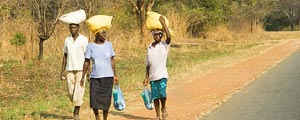
The women, some with babies strapped on their backs, wait patiently and anxiously for prospective customers along the major highways while displaying heaps of yam, bananas, tomatoes and an assortment of wild fruit.
Michelle Chifamba
They are desperate to earn a living for their families through horticulture, which has slowly become the main source of livelihood for many in Manicaland.
Some women in Chipinge have started a horticultural project which aims to generate income for village widows and enable them to look after their children and orphaned grandchildren.
Project Founder of Roots and Buds, a small–scale horticulture project in Checheche, Chipinge, Elizabeth Mpatsi says the project focuses on training local women in intensive small-scale horticulture and local food marketing skills to enable them to sell their produce in nearby growth points and urban centres.
“We aim to encourage the rural women to be self-sustaining. Through horticulture many women are enabled to sell their produce to nearby centres and earn a better living for their families. In a patriarchal society like Zimbabwe,” said Mpatsi.
“Women in rural areas face a lot of challenges. Their husbands deny them the opportunity to go and sell their produce in urban areas because they have to spend days away from home.”
Vivian Zivira, a small-scale horticulture farmer from Nyanga, says many women in her community face challenges in trying to secure loans to start income generating projects. Banks take too long to process their applications and charge high interest rates.
- Chamisa under fire over US$120K donation
- Mavhunga puts DeMbare into Chibuku quarterfinals
- Pension funds bet on Cabora Bassa oilfields
- Councils defy govt fire tender directive
Keep Reading
“It takes between six and 12 months to access loans from banks who demand collateral to process the loans. I was provided with the collateral by my husband. They gave me $5 000 at 25% interest,” she says.
“Despite a very good repayment record, the bank could not increase the second loan. Widows and some poor households do not have access to collateral. In that case many women in the rural areas remain poor, deprived and less empowered.”
According to a Food and Agriculture Organisation (FAO) 2012 report, rural women play a key role in supporting their households and communities in achieving food and nutrition security, generating income and improving rural livelihoods and the overall wellbeing. “Women contribute to agriculture and rural enterprises and fuel local and global economies. As such, they are active players in achieving the Millennium Development Goals (MDGs). Yet, every day around the world rural women and girls face persistent structural constraints that prevent them from fully enjoying human rights and hamper their efforts to improve their lives,” notes FAO.
A truck driver from Chipinge, Talent Viriri, says he buys produce from the women as a means of supporting their efforts. “I buy the produce from rural women because I feel that is the only source of empowerment.
The times are hard and the women need a source of income. At least they are trying to earn an honest living through vending,” he says. In May this year, United States Embassy in Zimbabwe held a one-day “Women in Agriculture” workshop in Harare which called for greater support of women in agriculture, increase awareness of gender-related issues and identify practical solutions for addressing gender disparity in the rural agriculture sector.
United States Ambassador Bruce Wharton urged local finance institutions to provide more loans to women in agriculture and encouraged the government to improve legal support and public services for women farmers.
“It is vital to increase women’s access to finance and credit. My government would like to find practical homegrown solutions for women to access credit and help them to participate actively and equally in the economy of Zimbabwe. We believe it is critical to reduce gender disparities ranging from resources and wealth, to opportunities and services,” said Wharton.
Zimbabwe adopted a new constitution in May this year, and women in parliament encouraged women to participate in politics and decision-making positions to enable the women to effect changes in their constituencies.
“Women face a lot of challenges and the representation of women in Parliament will give them a voice and, therefore, improve their status,” says Biata Nyamupinga, chairperson of the Regional Women’s Parliamentary Committee.
MDC parliamentarian Roselyne Nkomo says there is urgent need to focus on the plight of rural women and girls to eradicate poverty.
“While we are celebrating the 50-50 representation of women in Parliament and the new Constitution which has provisions which approves 18% of women to participate in Parliament. We want to implement the policies that were being highlighted in the new constitution,” said Nkomo.
Women’s rights activist Grace Chirenje urges government to fully empower women so they can participate in economic production.
“Policymakers must, therefore, adopt systematic approaches for the empowerment of rural women. Rural women and girls should be prioritised in rural development and agricultural policies and programmes,” she says.











